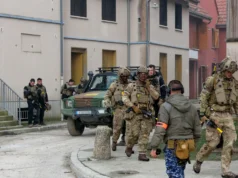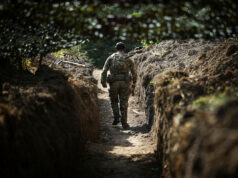The House of Commons heard a tense exchange on Thursday over deepening nuclear cooperation between the UK and France, after Defence Minister Maria Eagle confirmed a landmark declaration would see both nations coordinate responses to extreme threats to Europe for the first time.
Pressed by Conservative MP James Cartlidge on why the government had not issued a formal statement to the House, Eagle replied: “There has not been a statement yet because the agreement has not been signed yet… I’m sure as soon as it is signed… we will be able to provide further detail.”
She emphasised that the new arrangement would not alter the UK’s independent nuclear posture. “Our nuclear deterrent in any circumstances can only be authorised by the Prime Minister. That remains the case,” she said. “This is not a new doctrine. Our nuclear doctrine is the same as it ever has been.”
Eagle stressed that the agreement reflected the growing alignment between the two European nuclear powers. “There is an opportunity when vital interests are affected for coordination between both nations in the way in which they respond. That just strengthens the power of the deterrent across Europe.”
Cartlidge had criticised the government for “such incredibly substantive matters not [warranting] a statement,” and demanded answers on what he called “a deep paradox”: increasing Franco-British defence cooperation while the UK “is still getting no access to hard cash and the European rearmament fund.”
He pressed for clarity on multiple fronts: “Can the Minister confirm where this will leave the operationally independent and sovereign nature of our existing Trident nuclear deterrent? How will that coordination take place in practice? How does this affect NATO and our close cooperation with the United States?”
Cartlidge also raised the issue of tactical nuclear weapons: “Will the UK and France now be looking at cooperation on tactical nuclear delivery options via our shared complex weapons industrial base?”
Eagle rejected any suggestion the government was pursuing tactical nuclear capabilities. “This Government does not see any use of any kind of nuclear weapons as tactical,” she said. “We are not proposing in this agreement to develop any new kinds of nuclear weapons. It is about coordinating the options that we have together to make Europe and the North Atlantic stronger.”
She insisted that the UK’s deterrent remains dedicated to NATO, and that the agreement simply affirms that “there is no extreme threat to Europe that would not prompt a response by both nations.”
Framing the development as “a manifesto commitment, a promise made and a promise kept,” Eagle said the UK-France partnership “strengthens the deterrent against our potential enemies by making it clear that the two nations will act in coordination, rather than entirely separately.”














It’s worth noting that the whole tactical nuclear weapon question was a bit of a red herring, because the French air launched nuclear missiles are not tactical weapons, they are sub strategic weapons… now you may ask what the difference is, simply really, its intent. The French will use their air launched weapons as a last warning before they go full strategic and trigger MAD, they will not use them to sculpt the battlefield. They could be tactical nuclear weapons… but they are “NOT”.. so we could jointly work on a tactical weapon while also deny we are.
I thought the reason to purchase F35As were to carry US made nuclear bombs. Would that be called tactical?